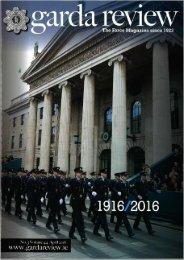Conference Report 2016
Table of contents contains links on page 5. It can be used to skip through chapters.
Table of contents contains links on page 5. It can be used to skip through chapters.
Create successful ePaper yourself
Turn your PDF publications into a flip-book with our unique Google optimized e-Paper software.
Section 1: Pay and Allowances<br />
industrial relations are required to prevent the current<br />
paralysis recurring.<br />
When the HRA expires on 1 July <strong>2016</strong>, members of the<br />
GRA will be outside of any national wage agreement, and<br />
the threat of the withdrawal of pay increments for those<br />
on the first 17 points of the pay scale remains real.<br />
Whether a new government will have the political will to<br />
further punish junior members of the Force on the basis<br />
of our democratic decision remains to be seen. This<br />
would be both unfair and unjust. As it stands – if section<br />
7 of the Financial Emergency Measures in the Public<br />
Interest Act 2015 (FEMPI) is invoked Government may<br />
freeze incremental increases until September 2018 for<br />
anyone not covered by a collective agreement.<br />
The Association has rejected the Lansdowne Road<br />
Agreement; and we contend that the Review of Industrial<br />
Relations for An Garda Síochána and Garda Pay should<br />
be completed before any further moves are made. The<br />
scope and remit for this Review was open-ended and not<br />
restricted by financial considerations. We hope that, like<br />
its predecessors, such a root-and-branch review will<br />
provide a roadmap for future negotiations and<br />
developments. The Conroy Commission of 1970 was<br />
seismic; followed nine years later by the Ryan Committee<br />
of Inquiry. The Haddington Road Agreement established<br />
what should become a contemporary version of the<br />
Conroy <strong>Report</strong>, updated to include the industrial relations<br />
mechanisms available to members. Our current<br />
mechanisms are outmoded and have repeatedly failed to<br />
sufficiently and fairly address the grievances and<br />
desires for a 21st century police officer.<br />
The Council of Europe made several key findings yet to<br />
be addressed; that Gardaí do not enjoy trade union<br />
status, automatic access to the instruments of State<br />
[the WRC] or the right to collective bargaining. The<br />
European Social Charter provides the right to take<br />
collective industrial action. Another adoption by the<br />
Council of Europe is the European Code of Police Ethics<br />
(2001) that facilitates equal social, economic and political<br />
rights for police officers with other citizens. The<br />
Haddington Road Review, under the auspices of the WRC<br />
has much ground to cover.<br />
Such long overdue reform and modernisation is welcome<br />
for many reasons; the future career prospects, work-life<br />
balance, job satisfaction and the means to satisfy the<br />
basic needs of all members among them. Other public<br />
servants were not granted such a wide-ranging review<br />
and this is recognition of the unique status of the garda,<br />
and the restrictions we operate under. Our job was<br />
utterly changed by the implementation of the Garda<br />
Síochána Act (2005) and we expect more tangible<br />
change in the months and years ahead as the<br />
organisation responds to the Police Authority and Garda<br />
Inspectorate.<br />
Hereunder is the Association’s submission to the<br />
Chairman of the Review of An Garda Síochána titled The<br />
Case for the Gardaí clearly Stated<br />
The Case for the<br />
Gardaí Clearly Stated<br />
SubmISSION TO ThE REVIEw Of INDuSTRIAl<br />
RElATIONS fOR AN GARDA SíOCháNA AND<br />
GARDA PAy<br />
Haddington Road Agreement 2013-<strong>2016</strong>, December 2015<br />
fOREwORD<br />
The Garda Representative Association (GRA) has most<br />
recently rejected the Lansdowne Road Agreement; while<br />
we can speculate as to why each individual within an<br />
overwhelming 86% of our members were unimpressed<br />
by the deal, we can outline with some clarity the current<br />
obstacles facing our staff association. Unusually for a<br />
foreword to such a submission of industrial relations<br />
desires, dissatisfactions and grievances, it is worth<br />
listing them:<br />
1. There is no working mechanism for industrial<br />
relations within An Garda Síochána.<br />
2. Our members’ pay has been multiply reduced and<br />
not restored.<br />
38th Annual Delegate <strong>Conference</strong><br />
11




